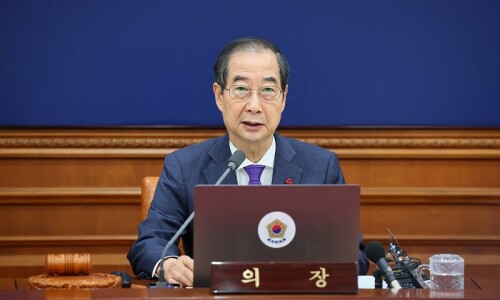KARACHI: At a time when the whole country, including Karachi, has been experiencing frequent and more intense heatwaves, raising calls for conservation of green spaces to cool off environment, hundreds of old trees are being cut down in the jurisdiction of Cantonment Board Malir (CBM) to make way for the Red Line Bus Rapid Transit (BRT) project, it has been reliably learnt.
Sources said while work at the project site in Malir was kicked off a month ago, a major tree cutting exercise was undertaken on Thursday outside the check post No.6 on the road leading to the airport, causing severe traffic jam as well as public outcry on social media platforms.
The species being removed, source said, were of the native neem and the exotic conocarpus. Both were planted at least two decades ago by the forest department on the cantonment board’s request.
The BRT project being funded by the Asian Development Bank, according to sources, was granted no-objection certificate by the Sindh Environmental Protection Agency (Sepa) in 2020 and the implementing agency is the transport and mass transit department of the provincial government.
According to the information shared at a public hearing of the project’s environmental assessment report in May, 2018, an estimated 23,693 trees existed along the BRT route, a large number of which would be uprooted, some would be transplanted and, if forest department’s suggestion was followed, around 300 indigenous trees would be spared.
Speaking to Dawn, senior environmentalists condemned the government action being carried in absolute disregard to public interest and area residents’ sensitivities.
The EIA report did not include any details of a traffic management plan. The project proponent had promised to ‘compensate’ the loss by planting more trees.
Public outcry
“It’s a loss that we can’t even quantify. Trees serve us in multiple ways, most importantly by absorbing air pollution, releasing oxygen, reducing temperature and improving diversity,” shared Prof Zafar Iqbal Shams, a senior teacher and researcher at Karachi University’s Institute of Environmental Studies.
He regretted that instead of growing more trees to mitigate the impact of rising temperature in the city, the government opted to remove the already established plantation, ignoring what’s happening in other parts of the world where countries were engaged in massive tree plantation and conservation campaigns.
New plantation, Prof Shams argued, could never be a substitute of old trees. “We must understand that trees take years to get mature and planting saplings couldn’t be described as their replacement. Even the fast growing conocarpus takes at least 10 years to get mature.”
Senior ecologist Rafiul Haq was of the opinion that it was not the right time to carry out any tree cutting campaign in the city already experiencing episodes of heatwaves.
“Second, the government should have taken all stakeholders on board, particularly the area residents, before launching the drive. Trees are silent but people who see them every day develop an attachment with them.”
Environmentalist Saquib Ejaz Hussain said the project proponent should have considered alternatives in order to conserve established plantation.
“Part of the project was new plantation which should have been grown much ahead of the project launch,” he said, while questioning the approval granted to the project.
According to the projects’ EIA report, the 23km-long Red Line running contiguous with New M.A. Jinnah Road, University Road, Malir Cantonment link road and M.A Jinnah Avenue in the north-eastern sector of Karachi cross districts Central, East and Malir Cantonment.
No relevant government official was available for comments.
Published in Dawn, May 20th, 2022















































